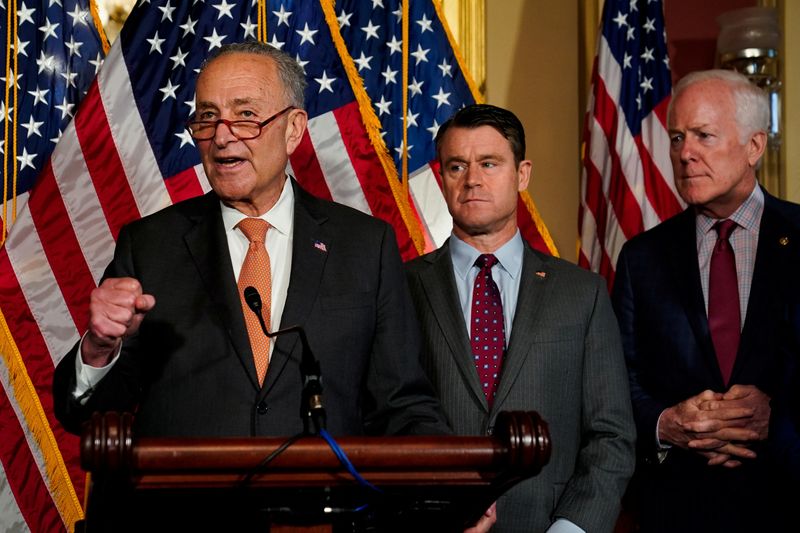By Richard Cowan and David Morgan
WASHINGTON (Reuters) -U.S. Senate Democrats aim to dodge "booby traps" including COVID and surprises from within their own ranks to pass a $430 billion drugs and climate change bill agreed to by Majority Leader Chuck Schumer and maverick Democratic Senator Joe Manchin after months of talks.
Passing the bill would be a win for President Joe Biden's party; it would impose minimum taxes on U.S. corporations and extend subsidies for the popular Obamacare health insurance program. Schumer aims to get it approved before the Senate's summer break, due to begin at the end of next week.
"There will be booby traps" on the way toward approval of the legislation, Democratic Senator Raphael Warnock told reporters on Thursday following a party caucus meeting. He added, however, that Democrats can "absolutely" win passage this summer.
In a White House speech, Biden said the bill would mark significant progress toward achieving his climate goals and restoring fairness to the federal tax code, while also addressing inflation.
"The work of the government can be slow and frustrating and sometimes even infuriating," he said, adding, "This bill is far from perfect, it’s a compromise ... that’s often how progress is made, is by compromises."
One key question is whether Democratic Senator Kyrsten Sinema, who, like Manchin, has blocked her party's legislative priorities in the past, will vote for the bill.
Sinema has not yet indicated support or opposition, but she has previously voiced approval for the idea of a 15% minimum tax on the most profitable U.S. companies. That tax was included in the framework unveiled late Wednesday.
Schumer plans to use a parliamentary maneuver to pass the package with only Democratic votes, bypassing normal Senate rules requiring 60 of the Senate's 100 members to agree. And his caucus members will also have to avoid contracting COVID-19 to be able to vote in person, as required by Senate rules.
Multiple Senate Democrats, including Manchin, as well as Biden, have tested positive for COVID in recent weeks.
Getting the bill passed could help Democrats stem their losses in the Nov. 8 midterm elections, when Republicans are favored to win a majority in the House of Representatives. Republicans also hope to regain control of the Senate.
MANCHIN: DEAL PROTECTS FOSSIL FUELS
Manchin, who would be up for re-election in 2024 in West Virginia, the No. 2 coal-producing state where former Republican President Donald Trump has broad support, took to the airwaves on Thursday to defend the bill.
"Fossil energy is recognized to be a major driving force and player in this piece of legislation," Manchin said in an interview with West Virginia-based MetroNews. He added that the measure will bring energy prices down while providing a pathway to alternative energy technologies over the next couple of decades.
The bill would provide about $370 billion over a decade to boost alternative energy and energy security. Schumer and Manchin estimated it would lower the U.S. government deficit by some $300 billion through measures including improved tax enforcement.
Top Senate Republican Mitch McConnell blasted the bill, calling it economically reckless at a time of soaring inflation.
"What's happening here is that Manchin and Schumer have reached an agreement that is absolutely horrendous and totally unnecessary given the inflation the Democrats have already created," McConnell said in a brief interview. "It's an unmitigated disaster for the country and we’re going to fight it as hard as we can."
But McConnell has few ways of stopping the bill if Schumer keeps his caucus united and healthy.
Meanwhile, new incentives for drilling for fossil fuels contained in the bill have some environmental groups fuming.
"This is a climate suicide pact. It’s self-defeating to handcuff renewable energy development to massive new oil and gas extraction," said Brett Hartl, government affairs director at the Center for Biological Diversity, an Arizona-based advocacy group.
However, the $370 billion, down from Democrats' earlier call for $555 billion, would cut U.S. carbon emissions blamed for climate change by 40% by 2030. Leah Stokes, a professor of climate and energy policy at the University of California, Santa Barbara, called the legislation "absolutely transformative."
A separate part of the package would allow Medicare, the government's healthcare program for the elderly and disabled, to negotiate prescription drug prices. Voters embrace the idea as a way of lowering medical costs that contribute to inflation. It also caps out-of-pocket drug costs for seniors at $2,000 annually.
The measure also includes heavy investments in electric vehicles in a bid to put a large dent in carbon emissions. The legislation would help lower the price of used EVs and provide incentives to manufacturers to increase production.
Republicans have attacked such investments, arguing that most Americans cannot afford EVs, with an estimated average price of around $60,000. There are a few EVs that retail for under $30,000, and the administration is pressing for new tax credits to make them more cost-competitive.

Instead, they want Biden to just encourage more domestic oil and natural gas production to lower gasoline prices, even though that would boost emissions of carbon and other pollutants.
"Let's not hear any more talk about EVs when we have a solution right in front of us," said Republican Senator Joni Ernst, referring to domestic drilling.